Women of the Internationalist Commune of Rojava made a call for an international feminist delegation throughout Rojava*. We wanted to get to know the women and society of the Rojava Revolution. The fight against patriarchy for freedom of human and natural life is an international struggle. Regardless how diverse our lives’ realities are, our hearts are beating in the same rhythm, are burning for the social revolution. All in all fifteen women and non-binary persons from the USA, Kurdistan and seven different nations of Europe followed the call. To discuss and to live autonomously in such a diversity is very important and gives us the possibility to feel, develop and live the strength of our worldwide relations.
Delegates arrived in early June and began the delegation by paying a visit to Jinên Cîwan in Qamişlo**, a group dedicated to young women’s involvement in the revolution. With them we went to the radio station “Dengê Cudî”. The station is powerful enough to broadcast into Nisebîn, the half of the city that’s behind the Turkish border wall. The radio is staffed 24/7 by youth but features programs representing a diverse cross section of society. There’s a special focus on young women, who read texts and discuss their role in society and the revolution. We also had an empowering moment where we sung a song, live, as visiting internationalists.
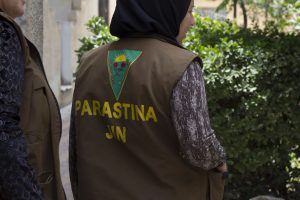 Afterwards, we had lunch together with the women of HPC-Jin (Hêzen Parastina Cîvaka — Forces for Defense of Society) . The HPC is the self-defense force of the communes and here, as in all the structures, women are also organized autonomously. The women, mostly mothers and grandmothers, developed their self-confidence through the philosophy of Abdullah Öcalan and years of revolutionary work. Later, we visited Asayîşa Jin where we met wonderful women who are devoting themselves to the defense of society.
Afterwards, we had lunch together with the women of HPC-Jin (Hêzen Parastina Cîvaka — Forces for Defense of Society) . The HPC is the self-defense force of the communes and here, as in all the structures, women are also organized autonomously. The women, mostly mothers and grandmothers, developed their self-confidence through the philosophy of Abdullah Öcalan and years of revolutionary work. Later, we visited Asayîşa Jin where we met wonderful women who are devoting themselves to the defense of society.
Back in Qamişlo we were invited to the Mala Bîrindar, or House of the Wounded. Mala Bîrindar is a collective living house for YPG-YPJ fighters who are badly injured in combat, where they can recover communally. At the moment, they are working to gain more official recognition so they can secure outside help for these injured fighters. Without this, their ability to get access to life-saving treatment and therapy is limited by embargo and political malpractice on the international scale. Here, we met someone who fought alongside our international comrade Şehîd Hêlîn Qereçox, who fell şehîd (was martyred) in Afrin.
After a tea break in the academy of Jineolojî International in Amûde, we went to the Navenda Ciwanên Azad, the Center of the Free Youth in Dîrbesiyê, where we spent our time playing volleyball with the youth. In the evening we visited families of şehîds, mostly parents, brothers and sisters of young YPG-YPJ members. We spent the night divided up among these families; the next morning we started out to explore Jinwar, the Village of the Free Women.
Wow… What can be said about it? It’s a wonderful place being created there. As soon as we left the car we were captured by an atmosphere that opened all the chains wrapped around our chest.
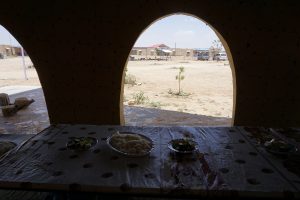 Jinwar, a women’s only experimental village, existed at first only as an idea and was brought into existence over the course of the past year. This air of playful, creative possibility is demonstrated throughout the project. When you are looking around, you can see the spaces in which human community will grow up in close harmony with the natural world. A huge section of the village is still a construction site, where women and men are working to build the houses out of traditional mud bricks. The [mostly male] workers, skeptical of the project when it began, have been won over to the point of visiting for tea on their days off. In the words of Hevala R—- “Wow… What can be said about it? It’s a wonderful place being created there. As soon as we left the car we were captured by an atmosphere that opened all the chains wrapped around our chest.”
Jinwar, a women’s only experimental village, existed at first only as an idea and was brought into existence over the course of the past year. This air of playful, creative possibility is demonstrated throughout the project. When you are looking around, you can see the spaces in which human community will grow up in close harmony with the natural world. A huge section of the village is still a construction site, where women and men are working to build the houses out of traditional mud bricks. The [mostly male] workers, skeptical of the project when it began, have been won over to the point of visiting for tea on their days off. In the words of Hevala R—- “Wow… What can be said about it? It’s a wonderful place being created there. As soon as we left the car we were captured by an atmosphere that opened all the chains wrapped around our chest.”
The next day, in Dîrbesiyê we were welcomed by Kongreya Star (the umbrella of all the organizations and institutions of women, equivalent to TEV-DEM). They are the site for coordinating and organizing the autonomous structures of the women, for example Mala Jin that we visited next is a part of Kongreya Star. Mala Jin (House of the Women), functions as a place for conflict resolution. For example, just when we arrived, right in the room next to us, they were searching a solution for the following situation: A man who lived in Europe for several years came back and married a women. Before the women agreed to the marriage she insisted on the condition that they will live as couple in the Democratic Confederation of Northern Syria. The man accepted, but now he wants to return to Europe. Other women are addressing Mala Jin because of domestic violence or oppression in the family.
From Dîrbesiyê we traveled to Serêkaniyê, another city which is bisected by the militarized border wall. We spend the night in the Komîna Film Rojava, who are working at the moment on a film about traditional Kurdish dances and songs, doing documentary work in the nearby villages.
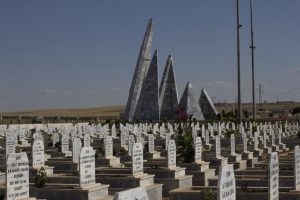 From Serêkaniyê we went to the city Kobanê, which became famous internationally for the fierce defense by YPJ women fighters that finally led to liberation from IS. The fight for liberation took the life of thousands of people. Our first place to visit was therefore the Şehidlik, the cemetery of the fallen liberation fighters that rests on the edge of the city. In the words of one of our delegates, “On this soil you are asking yourself many questions, you feel a deep hate toward the system growing in yourself, you start to get an idea what the fight against this system really means, what revolution means and which responsibility the şehîds are passing on to us.”
From Serêkaniyê we went to the city Kobanê, which became famous internationally for the fierce defense by YPJ women fighters that finally led to liberation from IS. The fight for liberation took the life of thousands of people. Our first place to visit was therefore the Şehidlik, the cemetery of the fallen liberation fighters that rests on the edge of the city. In the words of one of our delegates, “On this soil you are asking yourself many questions, you feel a deep hate toward the system growing in yourself, you start to get an idea what the fight against this system really means, what revolution means and which responsibility the şehîds are passing on to us.”
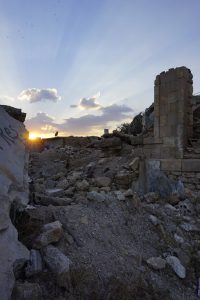 Back in Kobanê, we visited the museum of the şehîds and the quarter of resistance. It is a quarter that was not rebuilt after the liberation. It is like a museum, a huge memorial that shows the consequences of war, the meaning of destruction and resistance. The streets and houses are full of stories of the fallen fighters, the suffering of the population and their resistance, the cruelty of the Islamic State. And these stories are told by all the people around you. The mothers, the youth, the brothers, the fighters, the workers, everyone knows the stories of the şehîds, cherishing them, being able to appreciate what was given here for the defense of freedom.
Back in Kobanê, we visited the museum of the şehîds and the quarter of resistance. It is a quarter that was not rebuilt after the liberation. It is like a museum, a huge memorial that shows the consequences of war, the meaning of destruction and resistance. The streets and houses are full of stories of the fallen fighters, the suffering of the population and their resistance, the cruelty of the Islamic State. And these stories are told by all the people around you. The mothers, the youth, the brothers, the fighters, the workers, everyone knows the stories of the şehîds, cherishing them, being able to appreciate what was given here for the defense of freedom.
Şehîd Arîn Mirkan has a special place in the history of Kobanê. Her self-sacrificing action turned the tide of the resistance, making way for the liberation of a key strategic point from which one is able to overlook whole Kobanê. She gave the society and the fighters courage and confidence while draining morale from the Islamic State fighters, who believe that if you are killed by a woman you will be denied paradise after death. We visited Mistenur, the site of this action, and were able to see where the struggle unfolded beneath us.
On this soil you are asking yourself many questions, you feel a deep hate toward the system growing in yourself, you start to get an idea what the fight against this system really means, what revolution means and which responsibility the şehîds are passing on to us.
Shortly thereafter, we made a visit to a YPJ base where young women fighters are educated. It’s a place full of life, where each of them is able to tell out of their own experience what the meaning of self-defense is. It’s completely unlike the standard image of military barracks, it’s a place dominated by strong consciousness, where you are surrounded by love and where there’s a shared desire for peace and freedom.
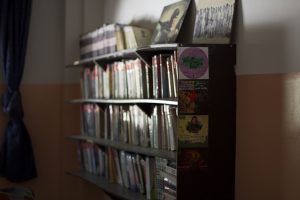 From here we visited the Mala Serokatî, the house in which Abdullah Öcalan stayed for two months after escaping from Turkey and before he was able to continue on the road to Lebanon. This place is very meaningful for the Kurdish movement, because here Abdullah Öcalan developed strategy, analyzed the situation, and built the basis for everything to come.
From here we visited the Mala Serokatî, the house in which Abdullah Öcalan stayed for two months after escaping from Turkey and before he was able to continue on the road to Lebanon. This place is very meaningful for the Kurdish movement, because here Abdullah Öcalan developed strategy, analyzed the situation, and built the basis for everything to come.
After we experienced so much in Kobanê, the YPJ made it possible for us to visit Raqqa and Tebqa, two Arabic cities that have just recently been liberated from IS. While in Kobanê struggle was mostly fought on the ground by Kurdish forces, these two former IS strongholds were liberated through the cooperation of YPJ/YPG/SDF with United States military air strikes. They are full of places where the IS committed inconceivable crimes to daunt and oppress the society and freedom fighters. The scape of the cities is very different than Kobanê. Huge swaths of the urban landscape are still destroyed; war with air strikes utterly changes the kind of destruction that takes place. War doesn’t look the same. People live and work in the midst of this, bringing the city back to life.
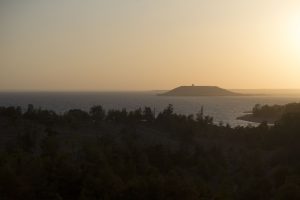 Finally, we were able to take part in the Qampa Jineolojî Ciwan – a camp for young women focused on Jineologî. Jineologî, a concept initiated by Ocalan, is a fusion of science, feminism, gender study, and history. We camped with about fifty other young women on the banks of the Euphrates. We woke up together, ate, exercised, and participated in the following educations: Being Yourself, History of Patriarchy, the Search for Truth by Abdullah Öcalan, Jineolojî, Free Partnership Life. In the evening we took part in various workshops – driving a car, playing the drums, painting, English lessons, there were also lessons for Kurdish handwriting and other things that happened after we left. On our last day we all went to a swimming pool. We laughed a lot, cooled down, taught each other how to swim, ate water melon and drank lemonade, danced and listened to music, and built our ties of hevaltî (friendship).
Finally, we were able to take part in the Qampa Jineolojî Ciwan – a camp for young women focused on Jineologî. Jineologî, a concept initiated by Ocalan, is a fusion of science, feminism, gender study, and history. We camped with about fifty other young women on the banks of the Euphrates. We woke up together, ate, exercised, and participated in the following educations: Being Yourself, History of Patriarchy, the Search for Truth by Abdullah Öcalan, Jineolojî, Free Partnership Life. In the evening we took part in various workshops – driving a car, playing the drums, painting, English lessons, there were also lessons for Kurdish handwriting and other things that happened after we left. On our last day we all went to a swimming pool. We laughed a lot, cooled down, taught each other how to swim, ate water melon and drank lemonade, danced and listened to music, and built our ties of hevaltî (friendship).
Then the time came to say goodbye, not only to the comrades of the camp, but also to our time as a delegation. In these weeks we had experienced, heard, felt and saw so many things. But one complete part remains unseen: Afrin. In March, Turkey (the second biggest NATO Army) occupied Afrin after a fifty eight-day defensive struggle. Since than the occupying soldiers are committing massacres and plundering society, casting the people out from their homes, from their beloved land. As women of the Internationalist Commune of Rojava and as group of this delegation we condemn the actions of these occupiers. Afrin is and will remain a part of the Democratic Federation of Northern Syria. It will be free again and it is the task of all the freedom-loving people all around the world to fight for it!
Now we are preparing to depart from the International Commune. We have seen the complexities and reality of the revolution, society and life in the Democratic Federation of Northern Syria. We are feeling the seeds of resistance starting to bear fruit inside of us. We are full of hope, convinced that this world will change along with this change in ourselves.
Žene, Život, Sloboda! Jin, Jiyan, Azadî! Women, Life, Freedom!
Femmes, Vie, Liberté! Frauen, Leben, Freiheit! Mujeres, Vida, Libertad!
*The area we’re often calling Rojava has actually decided to rename itself the Democratic Federation of Northern Syria to more accurately reflect the multiethnic nature of society, especially now that primarily Arabic cities are members of the democratic system. In practice, at the moment Rojava and DFNS are still fairly interchangeable, but expect to see more use of DFNS as time goes on.
**Meaning: Young women. Pronounced: “Zchinen Jeewan” and “Kamishlo,” respectively. In the kurdish alphabet, there’s a few more letters than in English. The C makes a “j” sound, the Ç is “ch”, J is pronounced like the S in “casual”, and so on. For an introduction to the alphabet, check out http://learnkurmanji.com/lesson/lesson-1-alphabet-and-sounds/.